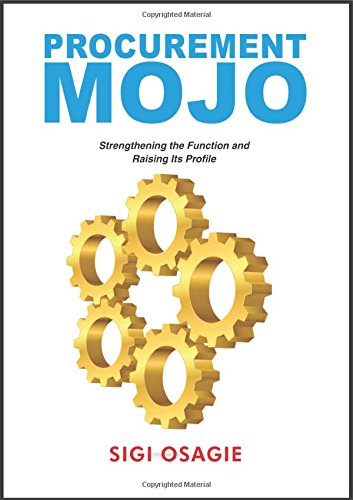This book has been around for over a year or so but I only got round to reading it after receiving it as a Christmas present from one of my daughters. To be honest I think it was the title which put me off previously and, to be honest, try talking to a C-level stakeholder about the 'procurement mojo' and I suspect doors will close.
The book is well positioned in a niche which I'm unaware of others having addressed; setting aside procurement technicalities to focus on making the Procurement function more effective. You may well find some of the themes familiar as they are really transferred from the management literature you would expect to find in one of those airport shops - nothing wrong with that and Osagie makes an excellent transfer. I really can't disagree with anything he says and can't think of any other book which addresses the themes in a Procurement context. Although I did think the chapter on Branding was weak (I will return to this in a later Blog post). It would be particularly useful for those interested in Procurement Organisation & Management or even Procurement Change Management.
I did find some of the references to Osage's and others' research a bit aggravating since the detail was missing and it tends to be anecdotal - so it wouldn't work as an academic source. I also found the frequent cliches and case studies, which seemed to be more about demonstrating Osage's pedigree, annoying.
Set all those criticisms aside and you have a really good, easy to read book, relevant to all those who want to improve Procurement's strategic positioning as a function. Osage's five step approach makes perfect sense and I suspect represents his own transformation approach:
- Build an effective Procurement organisation;
- Deploy robust fit-for-purpose enablers;
- Adopt robust supply base management;
- Apply appropriate performance management; and
- Build your Procurement brand.
I particularly liked the section on leadership but was surprised, when discussing processes, he didn't really explore the need to sort out processes only after you have define the new structure and roles.
At only £14.99 Procurement Mojo is particularly good value (there has been a recent trend in over-pricing Procurement books lately) and an easy read. I think I will use aid memoire.


